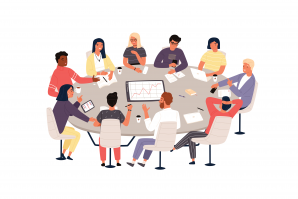Issues around diversity, equity and inclusion have dominated workplace conversations over the past few years as companies across the U.S. have begun to view diversity in their organizations as a top priority. One thing I have learned in a 37-year career in politics and communications is that bringing together groups of people who have varied backgrounds and experiences leads to more thoughtful and creative ideas. That collective intelligence is my team’s greatest strength and always results in better outcomes for our clients. I love that I learn from my colleagues every day, and I value our wide range of thoughts and opinions.
A diverse workplace
What do we mean by a diverse workplace? Racial diversity is often the first thing that comes to mind for many people. However, it is critical to consider the differences in race, ethnicity, gender, religious beliefs, generation, birthplace and political philosophies that contribute to an individual’s opinions. At Lucas Public Affairs, I am incredibly proud of the diverse team I help lead. Their personal experiences bring a wealth of different ideas and perspectives, and we choose to celebrate our differences and not allow them to divide us.
Making space for conversations
A good first step to being intentional about embracing the composition of your team is having open conversations. It is important to be a conscious leader and make space for conversations about critical topics of the day outside of and within the company. We tee up these conversations with positive intentions and mutual respect for the opinions of all our colleagues. We create a space for ongoing conversations by offering implicit bias trainings and a book club sponsored by our firm. The book club creates an opportunity for team members to learn from each other regarding timely public policy challenges such as homelessness, social justice efforts and the way they intersect with our work. I believe all leaders should consider convening a professional implicit bias training to help their teams address biases and embrace mindfulness and inclusion as daily practices.
“I believe all leaders should consider convening a professional implicit bias training to help their teams address biases and embrace mindfulness and inclusion as daily practices.”
Cassandra Walker Pye, President, Lucas Public Affairs
The importance of mutual respect and active listening
When it comes to managing the variety of opinions a leader hears from her staff, for me it’s pretty simple: We demonstrate respect to our coworkers and the thoughts and ideas they bring to the organization. And we engage in perspective-taking, which means slowing down and considering the “why” behind an individual’s point of view.
I believe a leader has a responsibility to consider the opinions of every single person on the team, even if the leader disagrees. It’s important to acknowledge their input and trust them to have a legitimate rationale for their position, based on their personal experience. Mutual respect calls for us to listen, actively and intentionally, with our teammate’s “why” in mind. I like to think of it as putting on another person’s glasses and seeing the world through their unique point of view.
Practicing mindful leadership and giving ourselves grace
Let’s face it. Two years of a pandemic has taken its toll on all of us. Early in the pandemic, when so much was unknown and we made decisions with only our best intentions at hand, I was reminded by someone younger and wiser than me to give myself grace — that is, to allow myself space to make mistakes, to trust and forgive myself, and to carry on. That advice carried me through the most difficult days, and I hold onto it and continue to share it.
Another tool in managing a diverse team and the multitude of opinions that come with it is practicing mindful leadership. Slow down. Listen actively. When possible, resist the urge to share your immediate feedback. Be intentional and ask questions (with a focus on the “why”). Be fully present, open-minded and compassionate. Slowing down and practicing mindfulness ensures your intentions are honorable and allows you to make that assumption about others as well.
The diversity of my team is by far its greatest strength. The ability to hear different perspectives and angles makes our work product so much better. We work hard to create an environment where every member feels comfortable bringing their own ideas to the table and can trust they will be heard. We may not always agree, but we trust ourselves and we trust each other. Our clients are the beneficiaries, but so am I.
Cassandra Walker Pye is president and chief strategy officer for Lucas Public Affairs, a Sacramento-based public affairs consultancy. Learn more at lucaspublicaffairs.com.
–
Stay up to date on business in the Capital Region: Subscribe to the Comstock’s newsletter today.
Recommended For You

Cyberbullies in the Workplace
Five ways to protect employees from virtual harassment
The emergence of remote work has broadened the horizons for
cyberbullying. We share the warning signs and five ways to
protect employees.

Turn Fear Into Your Superpower
Five tips to become the hero of your own career story
It’s natural to feel afraid of change, but turning fear into
excitement can help you take control of your career.

Why Workplace Culture Matters
Investing in your team and positivity at work should be a daily
priority. Here are four steps to make that happen.

How to Handle Political Discourse in the Workplace
Political, social, economic and personal issues can impact employee performance. Here are five ways employers can mitigate or diffuse potential conflicts.




